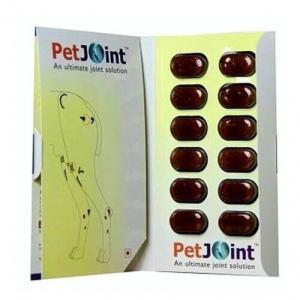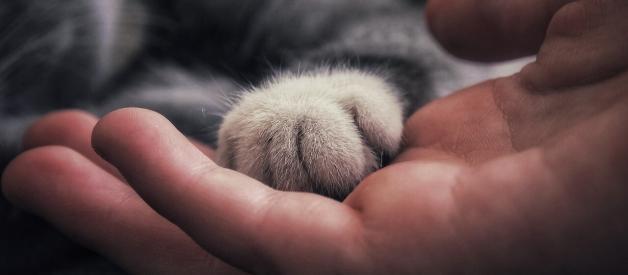Table of Contents
Taking care of the bones and joints in cats and dogs helps maintain comfortable movement, prevents conditions like arthritis, ensures proper posture and balance, reduces the risk of injuries related to falls, and supports weight management. Early detection and intervention can prevent severe issues, leading to a higher quality of life for our pets. Regular vet check-ups, a balanced diet, proper supplements, and appropriate exercise are essential for bone and joint health.

What Is PetJoint Tablets?
PetJoint, a premium joint solution by PetCare Cargill, contains glucosamine, chondroitin, and synergistic elements like MSM and vitamin C, specifically designed for the well-being of dogs and cats. This veterinarian-recommended formula addresses various bone and joint issues such as hip dysplasia, elbow dysplasia, leg bending, hind leg weakness, osteoarthritis, fractures, and more. It also promotes cartilage health and enhances joint mobility, benefiting older and senior dogs.
Ingredients
In every gram, you’ll find:
- Glucosamine Hydrochloride: 500mg;
- Chondroitin Sulphate: 400mg;
- Manganese Sulphate: 5mg;
- Boswellia serrata: 50mg;
- Withania somnifera: 50mg;
- Vitamin C: 12.5mg.
Dosage Sizes
|
Pet Weight (kg) |
Recommended Dosage (tablets) |
|
Up to 10 |
1 |
|
11 – 20 |
2 |
|
21 – 30 |
3 |
|
31 – 40 |
4 |
|
41 – 50 |
5 |
Please note that this table provides the recommended dosage based on the pet’s weight. Always consult a veterinarian before starting any supplement regimen for your pet to ensure the appropriate dosage.
Important Safety Information for Pet Owners
Before starting your pet on PetJoint or any supplement, consult your veterinarian. They can guide whether it suits your pet’s needs and any potential interactions with existing medications.
Ensure accurate dosing based on your pet’s weight. Follow the recommended dosage guidelines provided on the product label or as your veterinarian advises.
Watch for any signs of allergic reactions or adverse effects after administering PetJoint. If you notice symptoms such as itching, swelling, hives, or difficulty breathing, discontinue use immediately and seek veterinary assistance.
Monitor your pet while they are taking the supplement. If you accidentally ingest many tablets, contact your veterinarian or an emergency animal poison control hotline.
Purchase PetJoint from reputable sources to ensure product quality and safety. Counterfeit or substandard products may not provide the intended benefits and could pose health risks.
If you suspect any adverse events or side effects related to PetJoint, report them to the manufacturer and regulatory authorities as necessary. This helps ensure the safety of pets and other consumers.
Continue to schedule regular check-ups with your veterinarian to assess your pet’s overall health, including joint and bone conditions. Adjust the supplement regimen as needed based on your veterinarian’s recommendations.
PetJoint is intended as a dietary supplement and should not be used as a substitute for professional veterinary care and treatment. It complements, but does not replace, necessary medical interventions.
Retain the product packaging and information for reference, including the ingredient list and manufacturer’s contact details, in case you need to reach out with questions or concerns.
Veterinary Prescription
PetJoint is typically available as an over-the-counter (OTC) pet supplement, meaning it does not require a prescription from a veterinarian to purchase. However, regulations regarding pet supplements can vary by region and may change over time. To ensure accurate and up-to-date information, it’s advisable to check with your local pet stores, online retailers, or the manufacturer’s website for the most current purchasing requirements for PetJoint in your area. Additionally, consulting your veterinarian for guidance on supplements for your pet is always a good practice to ensure they suit your pet’s specific needs.
Interactions
PetJoint, like any dietary supplement, may interact with certain medications or health conditions in pets. While it is generally considered safe when used as directed, it’s essential to be aware of potential interactions and consult your veterinarian. Here are some considerations:
- Anticoagulant Medications: PetJoint contains ingredients like glucosamine and chondroitin, which may have a mild blood-thinning effect. Consult your veterinarian if your pet is on anticoagulant medications, such as warfarin or aspirin. They can advise on potential interactions and necessary adjustments to medication dosages.
- Diabetes Medications: The ingredients in PetJoint, particularly glucosamine, can affect blood sugar levels. If your pet has diabetes or is on medications to regulate blood sugar, consult your veterinarian to monitor blood glucose levels closely.
- Allergies or Sensitivities: Some pets may have allergies or sensitivities to specific ingredients in supplements. If your pet experiences itching, swelling, hives, or other allergic reactions after taking PetJoint, discontinue use and consult your veterinarian.
- Gastrointestinal Issues: In rare cases, pets may experience gastrointestinal upset, such as diarrhea or vomiting, when starting a new supplement. If these symptoms persist or worsen, contact your veterinarian.
- Other Medications: Inform your veterinarian of any other medications or supplements your pet takes. They can assess potential interactions and make appropriate recommendations.
- Underlying Health Conditions: If your pet has underlying health conditions, especially kidney or liver problems, consult your veterinarian before starting any new supplement regimen.
- Pregnancy and Lactation: Consult your veterinarian before giving PetJoint to pregnant or nursing pets, as the safety of these supplements during these stages may not be well-established.
While dietary supplements like PetJoint can benefit some pets, they should not replace professional veterinary care. Always consult your veterinarian before adding any new supplement to your pet’s routine, and closely monitor your pet for any adverse effects or changes in their health while using the supplement.
Side Effects
PetJoint is generally considered safe when used as directed, and side effects are uncommon. However, some pets may experience mild side effects. If you notice any unusual symptoms or side effects, discontinue PetJoint and consult your veterinarian. Here are some potential side effects that can occur:
- Gastrointestinal Upset: The most common side effect of PetJoint is mild gastrointestinal upset, such as diarrhea, vomiting, or soft stools. If these symptoms occur and persist, it’s essential to stop giving the supplement and contact your veterinarian.
- Allergic Reactions: While rare, some pets may be allergic to ingredients in the supplement. Signs of an allergic reaction may include itching, hives, swelling, or difficulty breathing. If you observe these symptoms, discontinue use immediately and seek veterinary attention.
- Increased Thirst or Urination: Some pets may experience increased thirst or urination while taking PetJoint. This is less common but can occur due to the supplement’s ingredients. Monitor your pet’s water intake and urination patterns.
- Blood Sugar Changes: Glucosamine, one of the components in PetJoint, may affect blood sugar levels. If your pet has diabetes or is on medication regulating blood sugar, monitor their glucose levels closely.
- Behavioral Changes: In rare cases, pets may exhibit changes in behavior or mood while taking supplements. Consult your veterinarian if your pet appears unusually lethargic, hyperactive, or anxious.
The majority of pets tolerate PetJoint well without experiencing any adverse effects. To minimize the risk of side effects, follow the recommended dosage guidelines based on your pet’s weight and consult your veterinarian before starting any supplement regimen.
Overdose
Overdosing on PetJoint is generally unlikely if the supplement is administered according to the recommended dosage guidelines. However, if you suspect that your pet has ingested excessive PetJoint, it’s essential to take immediate action. Here’s what you should do:
- Reach out to your veterinarian or an emergency animal poison control hotline immediately. They can guide you on how to proceed based on your pet’s situation.
- Be prepared to provide information about your pet’s weight, the amount and strength of PetJoint ingested, and any observed behavioral symptoms or changes.
- Depending on the circumstances, your veterinarian or the poison control experts will instruct you on whether any actions need to be taken, such as inducing vomiting or administering activated charcoal.
- Keep a close eye on your pet for signs of distress or adverse reactions. Be prepared to transport your pet to a veterinary clinic if advised by the professionals.
It’s crucial to prevent overdosing by following the recommended dosage guidelines for your pet’s weight and consulting your veterinarian before starting any new supplement regimen. Keeping the product packaging with dosing instructions and contact information for the manufacturer or poison control is also advisable in case of emergencies. Remember that prompt action and professional guidance are essential in the event of a potential overdose to ensure your pet’s safety and well-being.
Storage
Store PetJoint in a cool, dry place away from direct sunlight, moisture, and extreme temperatures. Avoid exposing the product to heat, humidity, or freezing conditions, as these can affect its quality. Ensure the container or packaging of PetJoint is tightly sealed when not in use. Exposure to air and moisture can degrade the supplement over time.
Store PetJoint out of reach of children and pets to prevent accidental ingestion. The packaging may have a child-resistant closure, but it’s best to take extra precautions.
If the product comes with specific storage instructions provided by the manufacturer, follow them carefully.
Always check the expiration date on the packaging before using PetJoint. Do not use the product if it has expired, as it may be less effective.
Retain the product label or packaging containing essential information such as the recommended dosage, ingredients, and manufacturer’s contact details. This information can be helpful in case you have questions or concerns.
Olivia Bennet is a veterinarian who has worked in a veterinary clinic for many years. She specializes in the diagnosis, disease prevention, and treatment of not only cute kittens and puppies but also large farm animals. Olivia loves animals, cares about them, and wants to help you know more about your pets.

































